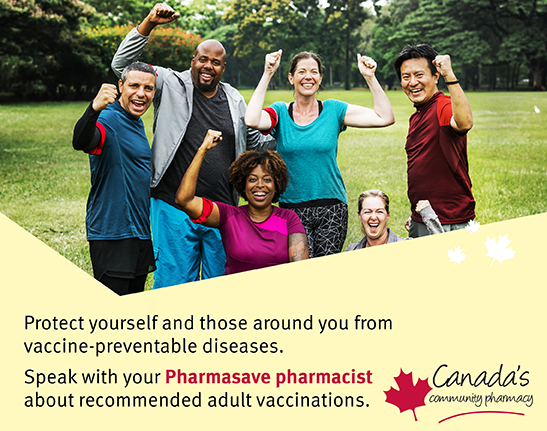
April – Adult Vaccinations and Oral Care
Picking the Right Vaccination for Specific Adult Populations
Even in adulthood, it’s important to be up to date on your vaccines to help avoid illness from vaccine-preventable diseases. Among adults, seniors and pregnant women, as well as people with certain medical, work, or lifestyle risks have special vaccination needs due to different risks.
Older adults
As you get older, your immune system weakens and your chances of getting sick from certain diseases increase. The protection you had against certain diseases from previous vaccinations also decreases with time. Getting another dose, known as a “booster,” can increase your immunity to keep you protected. Vaccine-preventable diseases that commonly affect older adults include:
Diphtheria
Diphtheria is caused by a poison released by the bacteria Corynebacterium diphtheriae. Since it commonly affects your airways, symptoms include mild fever, sore throat, swollen neck glands, weakness, coughing, and sneezing. These bacteria can also infect skin and can damage your heart, nerves, and kidneys if they enter your bloodstream. Although diphtheria is rare, adults are at an increased risk of getting this disease and it often results in death.
Herpes Zoster (shingles)
Shingles is caused by the same virus that causes chickenpox, but they usually develop differently on the body. Shingles often begins with painful, itchy and tingly sensations occurring typically on one side of the face or body. After several days, a rash forms in the affected area, and it blisters and scabs for 7 to 10 days. This painful, itchy, and tingly rash can significantly limit your daily activities, and can lead to complications such as vision loss or long-term nerve pain.
Influenza (flu)
Influenza is a virus that infects your respiratory tract and is contagious. Symptoms of the flu include fever, cough, sore throat, muscle or body aches, headaches, tiredness, and a runny or stuffy nose. Older adults should be vaccinated against the flu each year, as you are at a higher risk of developing pneumonia and other life-threatening complications from the flu.
Pertussis (whooping cough)
Pertussis is a highly contagious respiratory infection caused by the bacteria Bordetella pertussis. Symptoms include severe coughing fits followed by the need to take deep breaths that cause a “whooping” sound. While whooping cough can be mild in adults, it can be much more severe and even fatal in infants, children, and unvaccinated individuals.
Pneumococcal disease
You may have heard of the lung infection, pneumonia, but pneumococcal disease also includes infection of the ear, sinus, brain and spinal cord tissue, or blood. Depending on where the pneumococcal infection occurs in the body, you may experience different symptoms, such as difficulty breathing due to pneumonia, stiff neck from brain and spinal cord tissue infection, ear pain from an ear infection, or fever and chills from a blood infection. Older adults are at a higher risk of getting pneumococcal disease, leading to hospitalizations and even death, so getting the vaccine is highly recommended.
Tetanus (lockjaw)
Tetanus is spread from spores of bacteria found in the environment like soil, and they enter your body through broken skin. Common symptoms of tetanus are spasms and tightening of the muscles of the jaw, which is why tetanus is also known as “lockjaw.” It is a rare but serious disease that can cause death in adults. Getting vaccinated can help protect you against tetanus while being outdoors.
Many of these diseases and their serious complications can be prevented by your routine vaccinations. Check with your health care provider to see if you are up-to-date with these vaccinations.
Women who are pregnant or could be pregnant
If you are pregnant, or could possibly be pregnant, it is important to stay up to date on your vaccines to protect both yourself and your baby.
When you become pregnant, your immune system changes in a way that can put you and your baby at a higher risk of certain infections or complications, including some that can lead to birth defects, miscarriage, premature birth, or even death. By staying current with your vaccines, you can help ensure that you and your baby will have more protection against these potential health problems when you do become pregnant, especially in the case of an unplanned pregnancy.
However, some important vaccines are not suitable to receive during pregnancy. Try to plan ahead and update your vaccination status before you become pregnant.
It is also important that all members of your household are up-to-date on their routine vaccinations to protect your newborn from infections.
Talk to your health care provider about vaccinations to protect you and your baby.
Specific medical, work, or lifestyle risks
If you have certain medical, work, or lifestyle risks that increase your chances of getting sick from vaccine-preventable diseases, you may need more vaccines for added protection.
Examples of medical conditions include:
- asplenia (absence of a spleen)
- diabetes (type 1 and type 2)
- heart disease (i.e., stroke)
- kidney disease
- liver disease
- lung disease (i.e., asthma)
- weakened immune system (i.e., HIV infection, chemotherapy, transplant, immunosuppressive therapy)
Examples of work or lifestyle risks include:
- health care and child care workers
- injection or non-injection drug use
- inmates of correctional facilities
- men who have sex with men
- new Canadians
- travellers (see below)
Talk to your health care provider about whether additional vaccinations are recommended for you.
Travellers
Travelling to other countries can increase your risk for certain diseases since you may be exposed to diseases that are not found in your home country. Before you travel, you should understand which diseases may be a risk for you. The type and number of vaccines you need depend on:
- your travel destination
- the type and length of travel
- your vaccine history
It’s important to plan ahead to make sure that you can get the necessary vaccines before you travel, especially since some vaccines require multiple doses. You should consult with your health care provider or visit a travel health clinic at least six weeks before you travel to ensure you have enough time to get all the necessary vaccines prior to your trip.
For more information on which travel vaccines are right for you, contact your health care provider, travel health clinic, local public health office or visit the Government of Canada website.
Ask Your Pharmacist
Question: I thought childhood vaccinations were effective for my entire life. Why do I need to get vaccinated as an adult?
Answer: Many adults are unaware they need to keep up to date with adult vaccinations. Just as with children, being up to date with your vaccines is the most effective way of avoiding illness from vaccine-preventable diseases. Did you know that you become more vulnerable to some vaccine-preventable diseases as you age? And don’t forget that vaccines don’t just protect you, they help to prevent the spread of disease to those around you as well. This is especially important if you are close to individuals who are at a higher risk of getting sick. Examples of high-risk individuals include:
- babies and children
- people with compromised immune systems
- pregnant women
You may also need vaccines as an adult if you:
- didn’t received them as a child
- are pregnant or trying to get pregnant
- need a booster shot to increase the protection from a vaccine you had a while ago
- need protection against diseases when travelling to other countries
If you are not sure whether you are up to date with your vaccinations, speak with your Pharmasave pharmacist. They can help you understand your unique needs and can provide most vaccinations in their pharmacies.
Check out our Adult Vaccination Page to learn more.
Health Tip
Dry mouth isn’t just bothersome and uncomfortable; saliva also helps protect your teeth and gums. Common oral health issues that can be aggravated by dry mouth include cavities, gum disease, fungal infections, gingivitis, and taste impairment.
People living with diabetes, on specific medications, or who are elderly, often produce less saliva, which can cause dry mouth as well as a burning sensation on the tongue and gums. Consider the following tips to help manage dry mouth and prevent complications:
- Brush your teeth with a fluoride or xylitol toothpaste after every meal
- Follow the schedule your dentist suggests for check ups based on your health status
- Stay hydrated
- Chew xylitol gum
- Floss daily
Do you live with diabetes? Learn more about diabetes-specific oral care here.
Speak with your Pharmasave pharmacist today about dry mouth and ask about over-the-counter options that provide relief.
All material © 1996-2013 MediResource Inc. Terms and conditions of use. The contents herein are for informational purposes only. Always seek the advice of your physician or other qualified health provider with any questions you may have regarding a medical condition.



